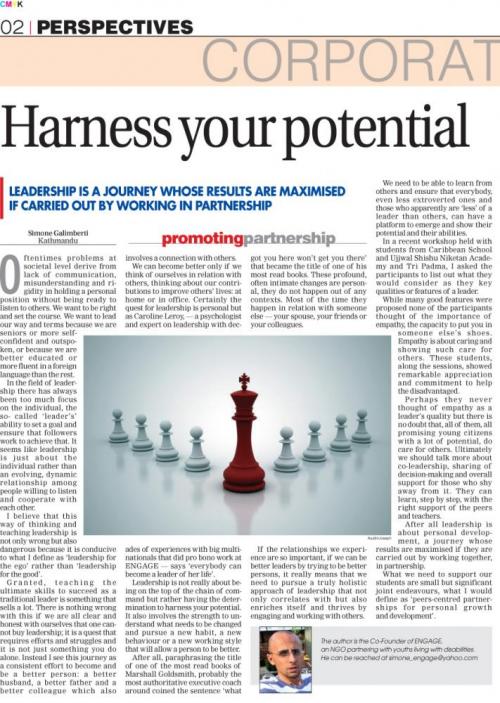
Oftentimes problems at societal level derives from lack of communication, misunderstanding and rigidity in holding a personal view or position without being ready to listen to the others.
We want to be right and set the course. We want to lead on our way and on our terms because we are seniors or because we are more self-confident and outspoken or because we are better educated or more fluent in a foreign language.
We do not show respect or curiosity towards those who we perceive as subordinate or anyone else we perceive as less capable.
Instead of common “win-win”, we go for our own win.
In the field of leadership there has always been too much focus on the individual, the so called “leader” able to set a goal and ensure that her followers get clear direction, support and encouragement to move through and achieve the desired targets.
It seems like leadership is just about the individual rather than an evolving, dynamic relationship among people willing to listen, cooperate with each other.
I believe this is way of thinking and teaching leadership is not only wrong but also dangerous because it is conducive to a leadership for the ego rather than leadership for the good.
Granted, teaching the ultimate skills to succeed as a traditional leader is something that sells a lot and attracts a lot of clamor.
After all the leadership industry is a multi-billion business and you can literally find thousands of training houses, coaches and academies offering you the best packages to explore, develop and leverage your potential and be a leader.
There is nothing wrong with this if we are all clear and honest with ourselves that the quest for leadership is not just about making a financial investment on your future.
You cannot buy “leadership”: it is a quest that requires efforts and struggles.
Instead I see this journey as a consistent effort to become and be a better person: a better husband, a better father and a better colleague but also it involves a connection with others.
We can become better only if we think of ourselves in relation with others, thinking about our contributions to improve others’ lives at home or in office while striving to improve ourselves.
Certainly the quest for leadership is personal but as Caroline Leroy says, a psychologist and expert on leadership with decades of experiences with big multinationals that did pro bono work at ENGAGE through the French NGO Planet Urgence, “everybody can become a “Leader of her life”.
Leadership is not really about being on the top of the chain of command but rather having the determination to harness your potential, understand how and where you can contribute the most and then develop the adequate skills that will help you get where you want.
It involves also the strength to understand what needs to be change and pursue a new habit, a new behavior or a new working style that will allow a person to be better.
After all, “paraphrasing the title of one of the most read books of Marshall Goldsmith, probably the most authoritative executive coach around coined the famous sentence “what got you here won’t get you there” that became the title of one of his most read books.
These profound, often intimate changes are personal, they do not happen out of any contexts. Most of the time they happen in relation with someone else: your spouse, your friends or your colleagues.
If the relationships we experience are so important, though often neglected, if we can be better leaders by trying to be better persons by the ways we behave and relate to the others, it really means that we need to pursue a truly holistic approach of leadership that not only correlates to others but actually enrich itself and thrives from engaging and working with others.
We need to be able to learn from others and ensure that everybody, even those less extroverts, those who apparently are “less” leaders than others, can have a platform to emerge and show their potential and their abilities.
In a recent workshop held with students from Caribbean School and Ujjwal Shishu Niketan Academy and Padma Kanya, I asked the participants to list out what they would consider as they key qualities or features of a leader.
While many good features were proposed none of the participants thought of the importance of empathy, the capacity to put yourself in someone else’s shoes.
Empathy is about caring and showing such care for others. These students, along the sessions, showed remarkable appreciation and commitment to help those disadvantaged.
Perhaps they never thought of empathy as a leader’s quality but there is no doubt that, all of them, all promising young citizens with a lot of potential, do care of others.
Ultimately we should talk more about co-leadership, sharing of decision making and overall support for those who shy away from it. They can learn, step by step, with the right support of the peers and teachers.
The youngest generations can learn to remain open to explore new perspectives and different points of view, welcome the idea of being positively challenged and find new room for positive middle ground solutions and create out of box complementarities.
After all leadership is about personal development, a journey whose results are maximized if it is carried out by working together.
Let’s call these small but significant joint endeavors “peers centered partnerships for personal growth and development”.










Add new comment